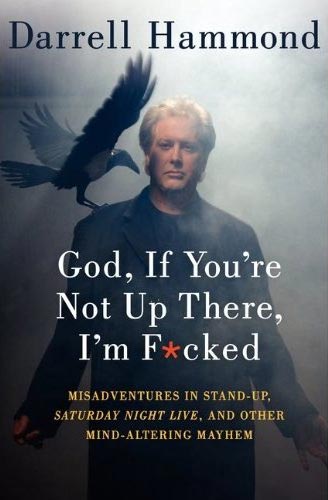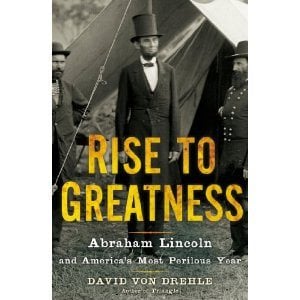 I was drawn to this book because I’m an avid Saturday Night Live fan. The show’s ability to weave entertainment with contemporary social commentary makes it a show that continues to be relevant into its third decade. Darrell Hammond is one of the more recognizable faces on the show because of his longevity (14 seasons, a record). His brilliance was his ability to impersonate almost anybody. While his most famous impersonation was Bill Clinton, he did a whole host of other impersonations, including Dick Cheney, Sean Connery, and most recently, Donald Trump.
I was drawn to this book because I’m an avid Saturday Night Live fan. The show’s ability to weave entertainment with contemporary social commentary makes it a show that continues to be relevant into its third decade. Darrell Hammond is one of the more recognizable faces on the show because of his longevity (14 seasons, a record). His brilliance was his ability to impersonate almost anybody. While his most famous impersonation was Bill Clinton, he did a whole host of other impersonations, including Dick Cheney, Sean Connery, and most recently, Donald Trump.
I had heard that Hammond had a history of drug problems. This book, a memoir, was his recounting and trying to come to peace with his past. And what a horrible past it was. Darrell’s dream growing up was to play baseball. He grew up playing with several future Major League Baseball players, including all-star and current Giants coach Bruce Bochy. He quickly developed an alcohol addiction that kept him from reaching his potential. He fell back onto comedy, something that he found he had a knack for. After a few decades of trying to make it, continuous battles with alcohol, relapses, rehabs, and all the various things that go with that, he got his big break and made it onto Saturday Night Live.
The rest is history, at least the history we knew from watching on screen. He did incredible impersonations, met every famous person you could meet, yet continued to struggle with alcohol, drugs, self-mutilation, and enough medications to fill up a pharmacy. He was diagnosed (at one time or another) as being: schizophrenic, manic-depressive, borderline personality disorder, major depressive disorder, and multiple personality. After another visit to the psych ward, a psychiatrist helped him delve into the root of his problems. This revelation, which Hammond goes into halfway through his book, has the effect of a grenade being thrown into a crowded room.
Hammond was severely abused by his mother growing up. He mentioned several instances that made me sick to my stomach. Her version of abuse was twisted in that it was secretive, manipulative, and just plain sick. His dad served tours in World War II and Korea, and was emotionally distant Darrell’s whole life. Hammond had no real parents. Worse still, his mother was an upstanding member of the Methodist church in town. Only Darrell knew the dark side, the side he had repressed for years.
All of a sudden, Hammond’s self-destructiveness makes perfect sense. He never had a healthy picture of life growing up. You can’t blame him completely for destroying his life. Comedy became a coping mechanism for him. When he was a child, he found that doing impersonations were the only thing that kept his mother at bay. When he entertained her, she didn’t abuse him. Horrifically sad. What makes it especially worse was that his mother was an active church-goer. He associated this negative behavior with religion and will most likely never turn to God because of it. At the time of the writing Hammond was sober, retired from SNL, and attempting to make peace with his demons.
LESSONS LEARNED
1. Parenting matters. Two parents’ inability to cope with life destroyed Hammond’s chance at a normal life. The way we parent our children will have profound affects on them throughout their lives. If not even for our sake, but for their sake, we need to strive to be the best parents we can, to give our kids a healthy shot at life.
2. When hypocrisy exists in the church, generations are affected. Hammond’s mother’s inability to rectify her active church attendance with her horrific abuse of her son has forever tainted Hammond’s view of God and religion. Not only that, Hammond has a daughter who has never been raised in religion because of her father’s bad experiences. One hypocrite = two generations and counting.
3. Before we condemn the “sinners” of the world, we need to find out their stories. My heart was filled with pity and compassion reading about the horrific childhood Hammond had. In the book, he recounted one stay in the psych ward where he met a pretty Hispanic girl nicknamed “the Mayor.” Upon his release, she told him they couldn’t be friends in real life. Here’s her explanation:
“I asked her why she like to steal so much.
‘I never had a chance. I was kidnapped. My dad was a drug addict, he OD’d. I was left on my own in Mexico. I never had a chance to go to school and join clubs and date. I didn’t have a childhood, and it wasn’t my fault. I’m owed.’”
While a person is always ultimately responsible for his or her own actions, her lack of childhood broke my heart. No child should have to endure what she or Hammond had to endure. Before we’re quick to condemn them (or others) for their sinful actions, it’s important to find about their formative years. While it never excuses their actions, it will always help explain their actions.
4. The sin of the world continues to grieve me. I read this book while preparing a sermon on the story of the Fall (Genesis 3) and the effects of sin in the world. I needed to look no further than the biography I was reading. Sin has infected every part of creation like a cancer. Only the blood of Christ offers any hope of redemption and life for humanity.
5. Does this explain the 60s? Shortly after I read this book, I talked with a man who also had an emotionally distant father who came back with scars from World War II. If my friend’s and Hammond’s experiences were the same, how many other children of World War II veterans experienced the same thing? If you had a whole generation of kids growing up in similarly dysfunctional homes, then the cultural outburst of the 60s suddenly makes a lot more sense.
QUESTION: Was there anyone in your life you too quickly condemned before you got to know their story?











